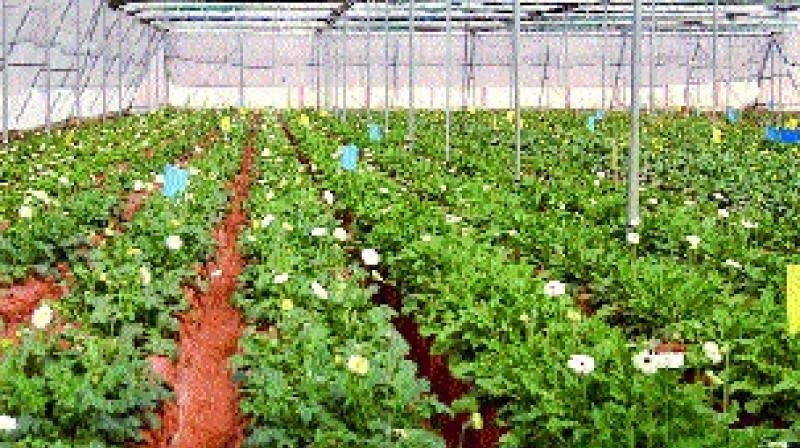Greenhouse cultivation sees multifold rise in Telangana
75% subsidy given to general category, 95% to SC and ST farmers.

HYDERABAD: Polyhouse cultivation has grown tenfold in the last three years. From a meagre 100 acres in the state for the past three decades, crops are now being grown in polyhouses in nearly 1,150 acres.
Better returns and less dependence on climatic conditions, compared to open field farming, has resulted in the farming community gradually showing interest in polyhouse cultivation.
In conventional agriculture, crops are grown in the open field under natural conditions where they are more susceptible to sudden changes in climate — temperature, humidity, light intensity, photo period and other conditions. As a result, quality yield of a particular crop could get affected and might be decreased
One big challenge in farming house is the high initial investment required for erecting green houses along with fully automated systems like drip iirgation systems and foggers (cooling systems in summer), photosynthetic active radiation lighting and bedding materials.
Though polyhouse farming concept has existed for over three decades, the decision of Chief Minister K. Chandrasekhar Rao to extend 75 per cent subsidy to encourage farmers exploring this form of cultivation proved to be a game changer, said horticulture director L. Venkatram Reddy.
Mr Rao, who prides himself on his agriculture background, explored this form of cultivation in his farm house at Erravelli on the city outskirts much before he became the Chief Minister. He got good returns and announced 75 per cent subsidy for farmers in the TRS manifesto for the 2014 elections.
The horticulture department worked out modalities to extend subsidy to farmers for growing vegetables and flowers.
Mr Venkatram Reddy said there was no mechanism in place earlier to create awareness on what type of crops to be grown, when to grow and how to maintain them and hence it was a failure. TS has sub-tropical agro-climatic conditions including Kharif, Rabi and summer seasons. Season-based crop cultivation in open fields has its limitations. Hence the government felt the need to encourage protected cultivation of vegetables and flowers. The horticulture director said 75 per cent subsidy was being given to the general category and 95 per cent to SC and ST farmers.
Realtors, bizmen take to polyhouse cultivation
The multi-fold increase in polyhouse cultivation in Telangana state has benefitted Hyderabad the most, according to agriculture secretary C. Parthasarathi.
The state capital has scores of function halls and star hotels which require exotic flowers and vegetables on regular basis and increased protected cultivation was fulfilling their needs. Exotic flowers and vegetables were conducive to greenhouse farming and with increase acreage of cultivation in TS, the needs were being met locally, he added.
“Stage decorators during weddings and other functions used to get exotic flowers like orchids, gerbera, and carnation from neighbouring states. Also coloured capsicum was being procured by star hotels from other parts of the country. With farmers who shifted to polyhouse cultivation growing these varieties, the city has now become self-sufficient,” Mr Parthasarathi said.
City residents from different backgrounds like real estate and business, have taken to this form of cultivation, attracted by the high subsidy.
Polyhouse Farmers Association president R. Narasimha Reddy said more than 95 per cent farmers were satisfied after exploring polyhouse cultivation. Mr Reddy said he was into protected cultivation for the last 13 years in Shamirpet, and, upbeat with the department support, had decided to establish another farm in 10 acres in Kamareddy.

